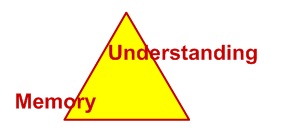
Memorization versus Understanding
Memory is a fundamental tool in the learning process. We are taught from a young age to develop our memorization skills. However, there is a significant difference between memorizing something and learning it. True learning does not occur until we are able to understand information then apply what we believed we have learned to a new situation or experience.
The following chart outlines the major differences between memorizing and understanding.
MEMORIZING
|
UNDERSTANDING
|
- Limits learning of ideas and concepts to word for word recall.
|
- Converts ideas and concepts into own words.
|
- Limits ability to generate insight or creative ideas.
|
- Creates a basis for generating insights and creative syntheses.
|
- Limits learning to actual words recalled.
|
- Advances the depth of learning.
|
- Inability to deduce or induce.
|
- Develops insights that come from deduction or induction.
|
- Has trouble seeing beyond the basic concept or idea.
|
- Can see meaning, effects, results, consequences beyond the basic idea or concept.
|
- Difficult to explain ideas to someone else other than word for word.
|
- Able to use own words to explain something clearly to someone else.
|
- Difficult to see how ideas apply in real-life situations.
|
- Can apply ideas to real life situations.
|
- Relevance of ideas outside the classroom is difficult to see.
|
- Ability to seek connections between knowledge learned in classroom and the outside world.
|
- Does not see differences, similarities, and implications of ideas.
|
- Can identify differences, similarities between ideas and implications of these ideas.
|
- Interprets ideas literally.
|
- Realizes that there can be figurative as well as literal interpretations of ideas.
|
- Strives for rote learning and has trouble solving problems when numbers or components are changed.
|
- Strives for understand and can solve problems even when numbers or components are changed.
|
- Believes there is one right answer to every question.
|
- Accepts that there may be more than 1 “right” answer to a question depending on circumstances.
|
Copyright © Dennis H. Congos, Certified Supplemental Instruction Trainer. University of Central Florida, Orlando, FL 32816 – 407-823-3789

